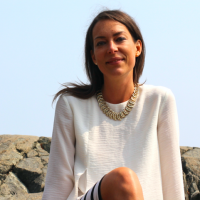![]()
As a high-achieving society, we often believe that we must do (and be) better than we presently are.
We also tend to imagine that instead of being whole and complete humans, we must somehow be fractured, broken, and needing to be fixed before we can live the the life we think we might deserve. (Phew, I’m exhausted simply describing the way in which we throw ourselves under the bus. You?)
Many of us are in a state of fatigue regularly, because we put so much energy into the attempt to be something else—someone other than who we are. We try to be a human who is, in fact, not human at all. We attempt to be perfect, but as humans, we are all meant to be perfectly flawed. When I say flawed, I mean real, as there is never anything wrong with being our authentic selves.
There is a curious thing that has unconsciously spun off from the well-meaning self-help world, and it seems to be the belief that we need to change who we are. With all the advice on how to improve our lives, how to love better, cleanse further, we cannot help but be left in a thick stew of not good enough. Well, I don’t totally agree.
What if we were good enough…today?
With the “Law of Attraction” becoming hip and the long-spoken phrase “fake it ’til you make it” rolling off our tongues, isn’t it curious that we still don’t allow ourselves to feel okay?
In psychological literature and academic studies, we are often told that through the process of growing up, we become “fragmented” individuals. We are informed that because of how our parents raised us, and because of their own lack of wholeness, we become damaged. (At least, I was lectured on this topic many times.)
So, what does this do to us as grown adults? Well, it seems we absorbed this concept like a sponge—we’ve accepted that we are innately “unwell” and must get “better.”
There is validity in the desire to live well (live better?), but it might serve us well to look at the motivation from which we do. When we attend to ourselves with a feeling of unworthiness and “not being good enough,” we often grasp toward needing something different—and we carry anxiety. However, if we address ourselves and our lives as being already whole—and we choose to believe we can live well, because we know how to do so innately—our experience and enjoyment of life can shift massively.
Happiness is not so much a state of being, but a change in perspective. Wholeness is precisely this too.
In the sect of Buddhism I follow, we believe that the journey of life is not about the goal to arrive somewhere special one day, but rather, to live in a way that makes today become this already. This does not mean our exterior circumstances are always ideal, or that we look or act in exactly the way that we might always want to—but it does mean that we radically accept the present for what it is, and we decide it is lovable and of value.
I used to live my life thinking that one day it would truly begin. Being attached to disciplined yoga, writing, and meditation practices, I believed that I could get all my flaws worked out quickly if I worked harder at personal reflection and improvement. What I realized when I became a burnt-out, late-20s woman was that I hadn’t allowed myself to enjoy much of who I was up until then, as I was waiting to become a more whole version of myself.
Does this sound familiar?
I used to say I was not afraid of death, but I was afraid of dying without ever having felt that I’d truly lived. Now, I am afraid of death, because I love the feeling of living—in wholeness.
Again, wholeness is an idea and a perspective—and we can choose to see ourselves this way…today.
Here’s a mirror-gazing practice I designed that has supported me (and my clients) in accepting ourselves as whole:
>> Sit or stand in front of a mirror.
>> Make sure this is a place where you feel you will have a few minutes of solace to be with yourself.
>> Look at your face—specifically, stare into your own eyes. (This is not a critical stare; it is an opportunity to see into the depth of your own beautiful soul.)
>> Say to your reflection: “Hi, ______ (your name).”
>> Say to your reflection: “I see you. You are whole.”
>> Continue to stare into your own eyes—and just notice the mystery and love in them. It’s okay if they are tired, or sad, or excited, or happy—that is all part of being a whole human.
>> Say to your reflection: “I love you. Thank you.”
>> Smile at yourself.
This simple practice can help to uplift the years of conditioning we’ve had of not feeling like enough. We are not fractured or broken. Each of us is whole. Try it—why not take the chance of discovering that we are wonderful and complete already?
~
Relephant:
Beyond Good Enough: I am Whole, Just as I Am.
To the Women who don’t Feel like They’re Enough.
~
Author: Sarah Norrad
Image: Author’s own
Editor: Yoli Ramazzina
Copy editor: Catherine Monkman






Read 0 comments and reply